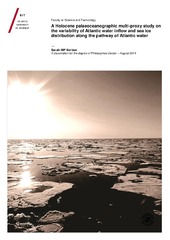A Holocene palaeoceanographic multi-proxy study on the variability of Atlantic water inflow and sea ice distribution along the pathway of Atlantic water
Permanent link
https://hdl.handle.net/10037/6801View/
Thesis introduction (PDF)
Berben SMP, Husum K, Cabedo-Sanz P and Belt ST: 'Holocene sub-centennial evolution of Atlantic water inflow and sea ice distribution in the western Barents Sea', Climate of the Past 10(2014): 181-198, (http://dx.doi.org/10.5194/cp-10-181-2014) (PDF)
Berben SMP, Husum K, Navarro-Rodriguez A, Belt ST and Aagaard-Sørensen: 'Atlantic water inflow and sea ice distribution in the northern Barents Sea: A Holocene palaeoceanographic evolution' (manuscript). Later published with altered title in Journal of Quaternary Science, Volume 32, Issue 5 (2017), and available at http://doi.org/10.1002/jqs.2953 (PDF)
Berben SMP, Husum K and Aagaard-Sørensen S: 'A late Holocene multi-proxy record from the northern Norwegian margin: temperature and salinity variability' (manuscript). Later published in The Holocene, Vol. 27(6) 822–834 (2017), and available at http://doi.org/10.1177/0959683616675934 (PDF)
Entire thesis in one comprehensive file (PDF)
Date
2014-10-14Type
Doctoral thesisDoktorgradsavhandling
Author
Berben, SarahAbstract
The aim of this PhD thesis is to deliver improved quantitative reconstructions of sub-surface temperatures, salinities and seasonal sea ice distribution. Additionally, the natural variability of Atlantic water inflow and seasonal sea ice distribution and possible forcing mechanisms such as solar insolation, atmospheric circulation patterns (e.g. North Atlantic Oscillation (NAO)) and atmosphere-sea ice-ocean interactions are investigated. This is achieved by analyzing planktic foraminifera (faunal assemblages and preservation indicators), transfer function derived SST records, stable isotopes (δ18O, δ13C), Mg/Ca ratios and sea ice and phytoplankton biomarkers (IP25; brassicasterol; 24-methylenecholesterol; PBIP25 index). This multi-proxy study shows the oceanic variability in the Norwegian and Barents Sea along the pathway of Atlantic water. For the western and northern Barents Sea, the Holocene paleoceanographic evolution is described and highlights the regional and proxy-specific responses to climatic forcing mechanisms such as solar insolation. Further, late Holocene observations of fluctuating climatic conditions in the Norwegian and Barents Sea are linked to shifting NAO conditions. Overall, this study contributes to the understanding of potential forcing mechanisms and aspects of ocean-sea ice-atmosphere dynamics, as part of the climate system. The integrated sub-surface water mass and sea ice records suggest that the interaction between Atlantic water and sea ice depends on additionally interfering factors such as insolation and the NAO. Hereby, a series of new high resolution multi-proxy records illustrate the complexity of the interacting elements of the climate system resulting in different possible natural scenarios of the environmental conditions.
Publisher
UiT Norges arktiske universitetUiT The Arctic University of Norway
Metadata
Show full item recordCollections
Copyright 2014 The Author(s)
The following license file are associated with this item:


 English
English norsk
norsk
